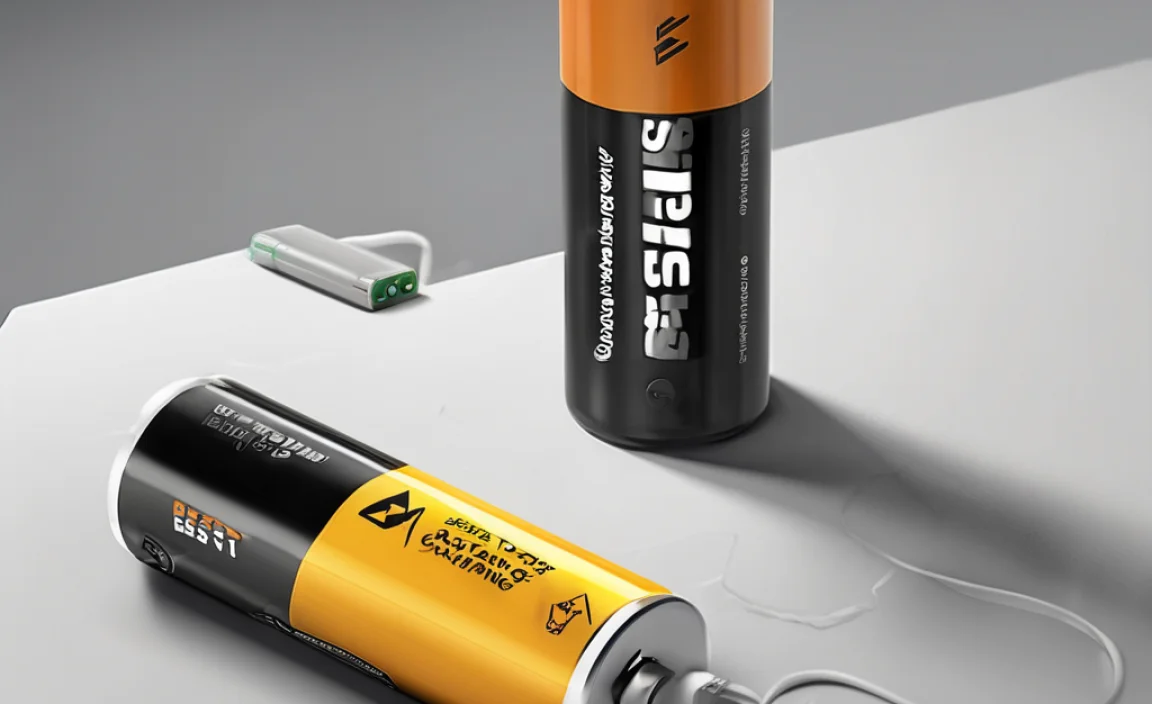A standard warranty on a battery typically lasts anywhere from 6 months to 3 years, depending on the battery type and manufacturer. For car batteries specifically, common warranty periods are 1-4 years, often with a pro-rated component after the initial free replacement phase. Understanding these terms is crucial for getting the most value and protection.
A Standard Warranty on a Battery: How Long Does It Really Last?
Ever bought a new battery, only to wonder how long you’re truly covered if something goes wrong? It’s a common question when dealing with everything from your car battery to your phone’s power source. Batteries are essential for our daily lives, powering our cars, phones, and other gadgets. When they stop working, it can be a real headache and an unexpected expense. But what exactly can you expect from a battery warranty? This guide will break down typical warranty periods, what they cover, and what you need to know to get the most out of the protection you have.
We’ll demystify those warranty cards and fine print so you can feel confident about your battery purchases and know your options if a battery fails prematurely. From a quick phone battery check to understanding the lifespan of your car battery, we’ve got you covered. Let’s dive in and get you clued up on battery warranties!
Understanding Battery Warranties: The Basics
When you buy a battery, it usually comes with a promise from the manufacturer that it will perform as expected for a certain period. This promise is called a warranty. It’s a safety net designed to protect you from manufacturing defects or premature failure of the battery under normal use. Think of it as the maker’s guarantee that they stand behind their product.
The duration and terms of these warranties can vary a lot. It’s not a one-size-fits-all situation. The type of battery, its intended use, and the brand all play a big role. For example, the warranty on a small power bank for your phone will likely be different from the warranty on a heavy-duty car battery that powers your vehicle.
Key Things to Look for in a Battery Warranty
Don’t just assume all warranties are the same. When you’re looking at a new battery, pay attention to these crucial details:
- Duration: How long is the warranty valid? This is usually stated in months or years.
- Type of Coverage: Does it cover defects, performance issues, or both?
- Replacement vs. Repair: Will they give you a new battery, fix the old one, or offer a partial refund?
- Pro-rated vs. Full Replacement: Some warranties offer a full free replacement for a set period, then a discount on a new one afterwards.
- Exclusions: What situations are NOT covered? (e.g., damage from improper installation, accidents, extreme temperatures).
- Proof of Purchase: You’ll almost always need your receipt or proof of purchase.
- Claim Process: How do you actually make a claim if something goes wrong?
Knowing these points upfront can save you a lot of confusion and potential disappointment down the line. It’s always better to read the warranty information before you buy, if possible, or keep it in a safe place after your purchase.
How Long Does a Standard Car Battery Warranty Last?
Car batteries are a significant investment, and their warranties are often more complex than those for smaller electronic device batteries. For a standard car battery, you’ll typically see warranty periods ranging from one year to four years. However, there’s often a distinction between full replacement warranties and pro-rated warranties.
Full Replacement vs. Pro-Rated Warranties for Car Batteries
Let’s break these down:
- Full Replacement Warranty: This is the best-case scenario. If your battery fails due to a defect within the stated period (e.g., 2 years), the manufacturer will replace it with a brand-new battery at no extra cost. This is common for the initial part of a battery’s warranty.
- Pro-Rated Warranty: Many car batteries come with a warranty that combines a full replacement period with a pro-rated period. For example, a “3-year free replacement / 2-year pro-rated” warranty means you get a free new battery for the first 3 years. After that, for the next 2 years (years 4 and 5), if the battery fails, you’d get a discount on a new battery. The discount amount usually decreases as the battery gets older. You’d pay a portion of the new battery’s cost based on how long you’ve owned the old one.
Typical Car Battery Warranty Ranges:
Here’s a general idea of what to expect:
| Battery Type | Typical Full Replacement Period | Typical Pro-Rated Period | Overall Warranty Length |
|---|---|---|---|
| Standard Passenger Car Battery | 1-3 Years | 1-2 Years | 2-5 Years |
| Heavy-Duty / Deep Cycle Battery (e.g., for RVs, boats) | 6 Months – 2 Years | 1-3 Years | 1-5 Years |
| Premium Car Battery | 3-5 Years | 1-3 Years | 4-8 Years |
Important Considerations for Car Batteries:
- Installation: Make sure your car battery is installed correctly. Improper installation can void the warranty. If you’re not comfortable doing it yourself, have a professional mechanic do it and keep the receipt. For guidance on safely installing a car battery, resources like AutoZone’s DIY guides offer helpful steps.
- Maintenance: Regularly check your battery’s terminals for corrosion and ensure it’s clean. Some warranties may require basic maintenance.
- Vehicle Type: Batteries for high-performance or commercial vehicles might have different warranty terms.
- Climate: Extreme hot or cold weather can affect battery life. While usually not a direct warranty exclusion, it’s a factor in longevity.
Phone Battery and Charger Warranties: What to Expect
Your smartphone is practically an extension of yourself, and its battery is its lifeline. When it starts holding less charge or acting up, it’s a major inconvenience. Fortunately, most smartphones and their included accessories (like chargers) come with a warranty.
Smartphone Battery Warranties
For most new smartphones, the battery warranty typically lasts for one year from the date of purchase. During this period, if the battery exhibits a manufacturing defect or its capacity drops significantly below its designed level (often defined as below 80% of its original capacity), the manufacturer may offer a repair or replacement.
- What is typically covered: Manufacturing defects, failure to hold a charge under normal use, unexpected shutdowns.
- What is NOT usually covered: Normal battery degradation over time (all batteries lose capacity with use and age), accidental damage (e.g., water damage, drops), damage from using unauthorized chargers or accessories, software issues that affect battery performance.
- Built-in Batteries: Most modern phones have non-removable batteries. If yours fails under warranty, the manufacturer will usually replace the entire phone or the battery internally.
- Removable Batteries: If you have an older phone with a removable battery, the process might be simpler, with just the battery being replaced.
Phone Charger and Cable Warranties
The charging cable and adapter that come with your phone usually share the same warranty period as the phone itself, which is often one year. If the cable frays or the adapter stops working within this time frame due to a defect, they should be eligible for replacement.
- Common Issues: Cable fraying near connectors, adapter not delivering power, intermittent charging.
- Tips for Longevity: Avoid bending cables sharply, don’t yank cords from the port, keep chargers and cables away from moisture and extreme temperatures.
Third-Party Accessories (Power Banks, Chargers)
If you buy a power bank or a third-party charger, the warranty will depend entirely on the brand. These can range from 30 days to 2 years or even a lifetime warranty for some premium brands. Always check the product packaging or the manufacturer’s website for specific warranty details.
How to Check Your Phone’s Battery Health
Many smartphones have built-in diagnostics to check battery health:
- iPhones: Go to Settings > Battery > Battery Health & Charging. You’ll see the Maximum Capacity percentage.
- Android Phones: This varies by manufacturer. Some have it in Settings > Battery or provide diagnostic apps. For example, Samsung often has Samsung Members app with diagnostic tools. Google Pixel phones might have it under Settings > Battery.
These tools can help you determine if your battery is underperforming due to degradation or a potential defect.
Power Bank Warranties: Keeping You Charged on the Go
Power banks are incredibly useful for keeping our devices charged when we’re away from an outlet. Like any electronic device, they can sometimes fail, making their warranty an important consideration.
Typical Power Bank Warranty Periods
The warranty period for a power bank is highly dependent on the brand and the price point of the device. You can expect:
- Budget Power Banks: Might have shorter warranties, often around 6 months to 1 year.
- Mid-Range Power Banks: Typically come with a 1-year warranty.
- Premium/High-Capacity Power Banks: Some reputable brands offer 2-year warranties or even limited lifetime warranties.
Factors Affecting Power Bank Warranties:
- Brand Reputation: Established brands with a focus on quality often offer better warranties.
- Capacity and Features: Higher-end power banks with more features might have longer warranty periods.
- Customer Reviews: Checking reviews can give you insight into a brand’s reliability and how they handle warranty claims.
What Power Bank Warranties Usually Cover
Similar to other gadget warranties, power bank coverage typically includes:
- Manufacturing defects that prevent the power bank from charging devices or holding a charge itself.
- Faulty ports or internal components.
What is Generally NOT Covered
- Normal wear and tear.
- Physical damage from drops, impacts, or water exposure.
- Damage caused by using incorrect cables or charging the power bank with an incompatible adapter.
- Overcharging or improper storage that degrades the battery.
When purchasing a power bank, it’s wise to check the warranty information. Many manufacturers provide details on their packaging or website. Reputable sources for tech reviews and comparisons, like RTINGS.com’s portable power reviews, often mention warranty details in their in-depth analyses.
Battery Chargers (Beyond Phones): Adapters and More
When we talk about battery chargers, it goes beyond just phone chargers. This includes AC adapters for laptops, power adapters for other electronics, and specialized chargers for things like power tools or even small appliance batteries. The warranty terms for these can vary wildly.
AC Adapters and Power Bricks
For laptop chargers, power adapters for gaming consoles, or similar AC adapters, the warranty period is often in line with the device they power, or slightly less. For example:
- New Laptops: Often come with chargers covered for 1 year.
- Standalone Chargers: If you buy a charger separately for a device, the warranty could be anywhere from 6 months to 2 years, depending on the brand.
Power Tool Battery Chargers
Chargers for power tool batteries (like those from DeWalt, Makita, or Milwaukee) often come with substantial warranties, reflecting their professional use and cost. These can range from 1 year to 3 years, and sometimes even longer for premium lines. It’s crucial to keep the charger and battery warranty information together, as they are often part of a system warranty.
What to Look For
The key takeaway for any charger or adapter is to:
- Check the manufacturer’s stated warranty period.
- Keep your proof of purchase.
- Use the charger only as intended and with compatible devices.
- Avoid physical damage or exposure to elements.
Some manufacturers, like Energizer, provide comprehensive warranty information for their various power products, which can be a good reference point for understanding typical coverage.
General Battery Warranty Timelines and Factors
To recap, there’s no single answer to “how long does a standard warranty on a battery last for?” because it’s highly dependent on the type of battery and its application. However, we can see some common patterns.
Summary of Common Warranty Durations:
| Battery Type | Typical Warranty Range | Notes |
|---|---|---|
| Car Battery | 1-5 Years (often with pro-rated) | Full replacement is common for the first 1-3 years. |
| Smartphone Battery (Built-in) |
1 Year | Covers manufacturing defects; normal wear not included. |
| Phone Charger/Cable | 1 Year | Usually matches the phone’s accessory warranty. |
| Power Bank | 6 Months – 2 Years (sometimes longer) | Varies greatly by brand and price. |
| Laptop Charger/Adapter | 1-2 Years | Can be tied to laptop
|




